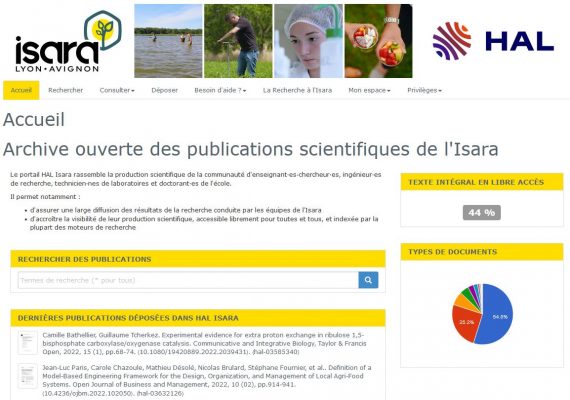L'Isara visible dans
l'archive ouverte HAL
Le portail HAL Isara rassemble la production scientifique de la communauté d’enseignant·es-chercheur·es, ingénieur·es de recherche, technicien·nes de laboratoires et doctorant·es de l’école.
Ce portail HAL Isara permet notamment :
- d’assurer une large diffusion des résultats de la recherche conduite par les équipes de l’Isara
- d’accroître la visibilité de leur production scientifique, accessible librement pour toutes et tous, et indexée par la plupart des moteurs de recherche
Le HALathon 2022
L’équipe du Centre de documentation propose aux enseignant·es-chercheur·es, ingénieur·es de recherche et doctorant·esde l’école de contribuer à l’ouverture de la science, en participant dès cette année au premier HALathon Isara !
Afin d’alimenter et faire vivre notre portail HAL, nous organisons en mai et juin 2022 une course collective aux dépôts des publications scientifiques : le HALathon made in Isara. Rejoignez-nous pour des ateliers de (re)découverte de l’archive ouverte et des sessions collectives de dépôt intensif afin de signaler tous vos articles et chapitres d’ouvrage…
Pour en savoir plus sur cet évènement, rendez-vous sur le portail HAL Isara !
Les dernières publications
Contact
Disciplines
Mots-clefs
Auteurs
Auteurs de la structure
Revues
Année de production
Institutions
Laboratoires
Départements
Équipes de recherche
- Lisa Besson, Sébastien Fontaine, Gaël Alvarez, Thomas Bécu, Olivier Duchene, et al.. Combining wheat and diverse perennial species: What is the impact on Z.tritici development and the wheat microbiome?. 14th Conference of the European Foundation for Plant Pathology, Jun 2025, Uppsala, Sweden. ⟨hal-05344982⟩
- Vincent Ducasse, Line Capowiez, Joséphine Peigné, Yvan Capowiez. Compost, digestate, and vermicompost from the recycling of urban biowaste have different impacts on earthworm behavior: a mesocosm study. Applied Soil Ecology, 2025, 210, pp.106095. ⟨10.1016/j.apsoil.2025.106095⟩. ⟨hal-05068093⟩
- Marie Perrin, Thomas Delattre, Nicolas Borowiec, Hazem Dib, Elodie Lecerf, et al.. Influence of high temperatures on the European earwig Forficula auricularia s.l. and the parasitoid Mastrus ridens, two natural enemies of the codling moth Cydia pomonella. Biological Control, 2025, 206, pp.105802. ⟨10.1016/j.biocontrol.2025.105802⟩. ⟨hal-05086196⟩
- Afifah Hamdan, Mohammad Naqib Hamdan, Sghaier Chriki, Anis Syahirah Mokhtar, Radhiahtul Raehan Mustafa. Insect-based food as alternative protein source: an analysis from the islamic perspective. Journal of Insects as Food and Feed, 2025, pp.1-13. ⟨10.1163/23524588-bja10228⟩. ⟨hal-05125611⟩
- Mathieu Rouge, Florian Celette. Améliorer la conduite des couverts en relais et leur réussite - Synthèse des travaux conduits dans le cadre du projet CASTOR : des Couverts Végétaux Au Service de la Transition agrOécologique et de la Réduction d’intrants. Isara. 2025. ⟨hal-05154482v2⟩
- Mathieu Rouge, Florian Celette. Présentation du projet et des dispositifs expérimentaux - Synthèse des travaux conduits dans le cadre du projet CASTOR : des Couverts Végétaux Au Service de la Transition agrOécologique et de la Réduction d’intrants. Isara. 2025. ⟨hal-05120647⟩
- Mathieu Rouge, Florian Celette. Évaluer les services éco-systémiques fournis par les couverts de trèfles semés en relais - Synthèse des travaux conduits dans le cadre du projet CASTOR : des Couverts Végétaux Au Service de la Transition agrOécologique et de la Réduction d’intrants. Isara. 2025. ⟨hal-05154559v2⟩
- Clara Lina Bader, Nina Isabella Moeller, Baptiste Grard, Alexander Wezel, Samuel Féret, et al.. Philanthropic Funding for Agroecology in Europe – Opening the (black) box of sustainable food system actors. Agroecology and Sustainable Food Systems, 2025, pp.1 - 30. ⟨10.1080/21683565.2025.2489416⟩. ⟨hal-05056229⟩
- Thomas Bécu, Audrey Niboyet, Gaël Alvarez, Lisa Besson, Nicolas Gross, et al.. Combining diversified prairies with wheat to promote beneficial plant-soil ecological interactions and the coupling of carbon and nitrogen biogeochemical cycles in agroecosystems. EGU25, Apr 2025, Vienna, Austria. ⟨hal-05085857⟩
- Sghaier Chriki, William Hallman, Jean-François Hocquette, Marie-Pierre Ellies-Oury, Masami Takeuchi. Food culture and cell-culture: technical, ethical and social frontiers. npj Science of Food, 2025, 9 (1), pp.49. ⟨10.1038/s41538-025-00417-8⟩. ⟨hal-05034786⟩


